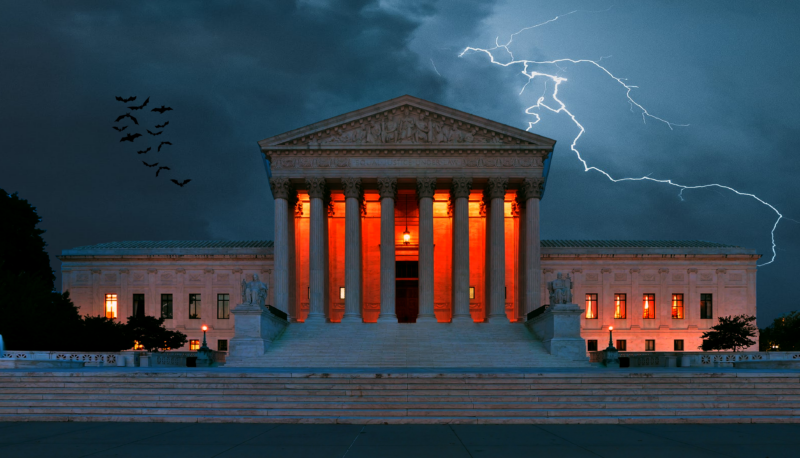It’s Halloween, and the scariest things we could think of this year are the Supreme Court and their upcoming case load. These cases could spell disaster around the country. The outcomes will affect people from the individual level to the institutional. So, without further a-boo, let’s get into three of the scariest things the Supreme Court could do this term.
1. Allow People Under Domestic Violence Restraining Orders to Have Guns
The first case that’s giving us the shivers is United States v. Rahimi. In this case, the Court will address whether people subject to a domestic violence restraining order have a constitutional right to firearms. Currently, under the federal Violence Against Women Act, it is illegal for someone subject to a domestic violence restraining order to have a gun. That could change if the Supreme Court decides to uphold a lower court ruling.
In 2022, another Supreme Court case, New York State Rifle & Pistol Association v. Bruen, created a new type of analysis for all firearms safety laws, making it so judges could no longer consider public safety interests. Instead, they can only uphold a gun law if a comparable law existed at the time the Second or Fourteenth Amendments were adopted. So now, under the Bruen standard, cases like Rahimi, a case about a man under a restraining order who was arrested for possessing guns, are getting second looks.
If the Supreme Court upholds the lower court’s decision and decides that domestic abusers can’t be prohibited from gun ownership because no such law existed in the 18th century, we’re all in trouble. With one decision, the Supreme Court could endanger countless people, many of whom have already been victimized.
2. Weaken Black Voting Strength by Accepting Racial Gerrymandering
Did South Carolina Republicans use illegal racial gerrymandering when they drew congressional districts? And did they do it intentionally to weaken Black voters? Those are the questions before the Court in Alexander v. South Carolina Conference of the NAACP. The case is about how South Carolina Republicans drew the boundaries for a congressional district long anchored in Charleston County. They moved more than 30,000 Black voters out of the district, which made it whiter and more likely to elect a Republican.
The Republican legislators who drew the map claimed they didn’t consider race, but a three-judge panel who heard the case didn’t buy the Republican legislators’ story. The judges unanimously ruled for the NAACP. Now it’s before the Supreme Court, and what they decide could have huge implications.
If the far-right justices find a way to uphold South Carolina’s map, it will open the door to even more gerrymandering that weakens Black voters and further erodes the democratic process so integral to our country. It’s tough to get scarier than that.
3. Make It Harder to Uncover Illegal Discrimination
In the frightening case Acheson Hotels v. Laufer, the Court could undermine the longstanding civil rights practice of using “testers” to uncover illegal discrimination. Right now, to comply with the Americans with Disabilities Act (ADA), hotels put accessibility information on their reservations website so a potential guest can determine if the hotel will meet their needs. A particular hotel’s website didn’t provide that information, so they were sued. The hotel has argued that since the individual wasn’t actually planning on staying there, they lack standing to bring the suit. This is where the idea of testing comes in.
Testing is a way of rooting out discrimination by having people, sometimes government officials and sometimes other organizations or even everyday individuals, inquire at establishments like hotels or apartments to see how they’re treated and accommodated. For example, a white couple and a Black couple might separately inquire about an apartment just to see if they’re treated differently. In 1982, the Supreme Court ruled that Black testers have standing to sue when they uncover racial discrimination that violates the Fair Housing Act.
Now however, the current Court could undermine the bedrock legal principle that the stigma of illegal discrimination creates enough of an injury to give standing to sue. That would make it harder to uncover illegal discrimination through testing and create a terrifying environment for everyone who worries about accessing accommodations or facing prejudice.
The Scares Never End with This Supreme Court
We’ve barely scratched the surface of what awaits us all this term, and we can’t bear to endure more right now. From everything we’ve mentioned already, to cases that could threaten all kinds of heath and safety protections and expand wealth inequality, this term could have serious consequences for the country. You can see all the horrifying details in our recent report: Another Dangerous Term Begins at the Supreme Court.
